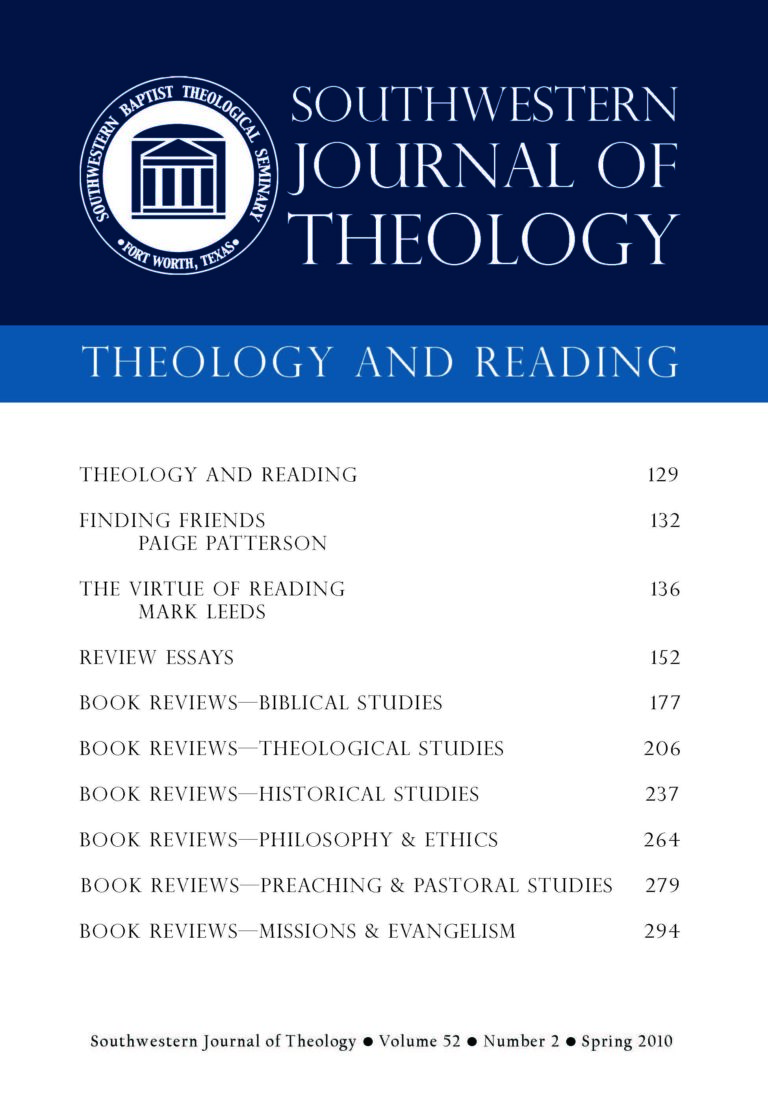
Theology and Reading
Southwestern Journal of Theology
Volume 52, No. 2 – Spring 2010
Managing Editor: Malcolm B. Yarnell III
Edited by David S. Dockery and Roger D. Duke. Studies in Baptist Life and Thought. Nashville: B&H Academic, 2008. 260 + xii pages. Softcover, $19.99.
Anyone who has studied the history of the Southern Baptist Convention would have come across the name of John Broadus. Not only was he one of the greatest American Baptist preachers in nineteenth century America, he also was a founder and second president of The Southern Baptist Theological Seminary. Given his prominence in Baptist life, it is puzzling that few works have been written about him; however, this first volume in “Studies in Baptist Life and Thought” attempts to fill this void with John A. Broadus: A Living Legacy, edited by David S. Dockery and Roger D. Duke.
Dockery and Duke have collected a number of essays written on a variety of aspects of Broadus’ career and ministry. As helpful as some of these articles are, Timothy George is correct in seeing that “The time is long overdue for a modern critical biography” (6). With that expectation set aside, fresh perspectives on the life of Broadus are presented.
David Dockery’s essay provides an overview of the life of Broadus, a help for those who have not engaged Broadus before. However, if one has read Dockery’s sketch previously there is nothing new here (cf. 44n50). Following this overview, A. James Fuller’s essay looks into the early life of Broadus and his preaching up until he moved to take the position at Southern Seminary. In sketching out an historical period of Broadus’ life it is accompanied by Craig C. Christina’s article (chapter 6) on Broadus’ involvement in the establishment and operating of Southern Seminary.
The remaining essays are concerned with specific features of Broadus’ life. Roger Duke’s article looks at the background of Broadus’ education in classical rhetoric. He shows how this training was implemented in his preaching and writing. Richard Melick’s interesting title, “New Wine in Broadus Wineskins,” raises the interesting question of Broadus’ relevancy for today. Here Melick discuses Broadus’ work in biblical studies as utilizing methods that are still appropriate today. At times, however one wonders if he is overstating Broadus’ impact. Thomas Nettles’ article looks at the impact A Treatise on the Preparation of Sermons had from the day it was published until now. In what seems to be an exhaustive effort, he cites from the reviews of the Treatise and shows its almost instantaneous success. The final article in the volume looks to Broadus’ lasting legacy. James Patterson shows the “core” of Broadus’ legacy under the headings of: Biblical Orthodoxy, Denominational Servant and Statesman, and a Theological Educator. He says that Broadus came “to symbolize the Baptists of his time” (257) and leaves a legacy for those in the twenty-first century.
Two essays in this work need to be especially highlighted for their work on the legacy of Broadus. The first is Mark M. Overstreet’s work on the “Lost Yale Lectures.” In researching Broadus at Southern Seminary’s library, Overstreet came across notes from the Lyman Beecher lectures Broadus delivered in 1889. Since Broadus delivered them extemporaneously he left no written record of them and they were subsequently deemed “lost.” The finding of these notes is greatly important for research on Broadus, which is why Overstreet’s overview of these notes is one of the most important essays in this collection. Not only does the essay give a glimpse at the lectures, but it also shows the matured Broadus’ emphases after a life of preaching.
Finally, Beecher L. Johnson has done a superb job in presenting Broadus’ views on sensationalism in preaching. Seeing the problem of sensationalism in our churches, Johnson looks to wisdom from Broadus on how to appropriate correctly sensation in preaching. He demonstrates that Broadus sees positives of sensation in preaching, but cautions against its use in that it can cause harm to the listener as well as the preacher.
The essays from Overstreet and Johnson make the work well worth having for anyone interested in the life of Broadus, but especially for the historian or the preacher. Overall the work is a decent look at the life of Broadus and provides an introduction to major elements of his life. However, if this volume has done anything it has firmly established the need for a modern critical biography. This work raises important areas in Broadus’ life, but lacks a unified exhaustive treatment a critical biography would provide. When that work is completed hopefully it will objectively place Broadus in his time as both the preacher and the teacher. Then also it should present his lasting impact on Southern Baptists and perhaps include a transcription of the notes from the Lyman Beecher lectures.





